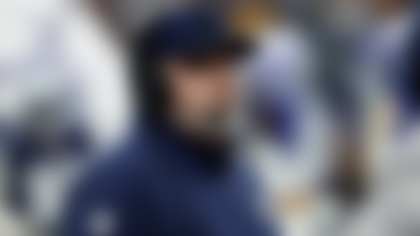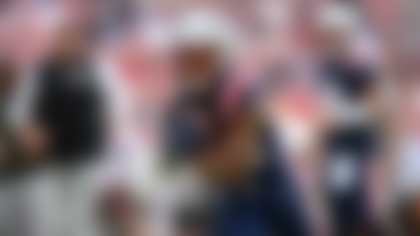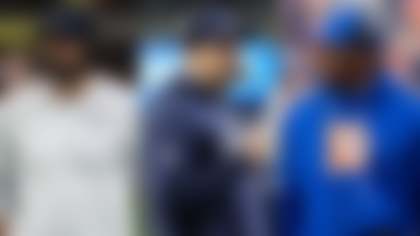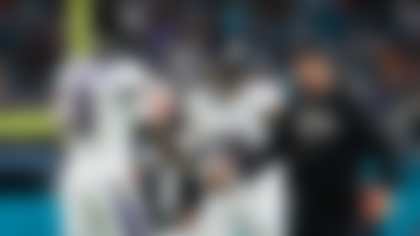Ray Anderson, the NFL's executive vice president of football operations, said Monday that harsher fines and possibly suspensions for helmet-to-helmet hits could be coming immediately, even for first-time offenders.
Anderson is involved with all levels of on-field discipline. After watching several Week 6 hits that he termed "egregious," "flagrant," and "really disturbing," Anderson said the league "will be more proactive" in dealing with any cases of potential head and neck trauma.
"It could happen immediately," Anderson said of the initiative after several players suffered apparent concussions Sunday. "The level of discipline on those types of hits is going to be much more aggressive ... and that could include a suspension even for a first-time offender."
Anderson said the degree to which players have been willing to lead with their heads and flaunt rules has caught the league's attention, and he pointed to comments made by former Indianapolis Colts coach Tony Dungy and former NFL safety Rodney Harrison. The pair, now football analysts for NBC, both espoused suspensions for such hits, and Harrison, who was fined more than $200,000 during his career, said the punishment "didn't get my attention."
"Fines aren't getting it done," Anderson said. "Suspensions will get their attention."
Anderson told The Associated Press that NFL Commissioner Roger Goodell will have the final say on any changes. League officials will consult with the NFL Players Association, too, but Anderson said he doesn't expect any opposition.
"Obviously, suspensions would be a much bigger deal than fining guys," Indianapolis Colts center Jeff Saturday, the team's player representative, told The AP. "But if guys are headhunting out there to knock a guy out of the game, that's the only way to take care of it."
Anderson said the league will continue to be severe in its handling of repeat offenders, saying there "will be even more elevated" discipline for those players. He spoke of "needing to change the culture when it comes to head and neck injuries like these," and termed the repercussions of such hits as "potentially life-threatening."
Anderson said he believes the consequences of such hits -- sometimes a player bounces back from a head-to-head hit and gets right to his feet; sometimes the struck player is rushed to the hospital -- shouldn't factor in the punishment. Players "should not get a break" if a hit that was potentially crippling ends up "not being as catastrophic."
Atlanta Falcons cornerback Dunta Robinson, New York Giants defensive end Jason Pierre-Paul, New England Patriots safety Brandon Meriweather and Pittsburgh Steelers linebacker James Harrison were among those players who delivered helmet-to-helmet hits Sunday and caused head injuries to opponents.
Ravens tight end Todd Heap took a vicious hit from Meriweather, then called it "one of those hits that shouldn't happen." The team was in contact with the league about the tackle.
"The thing we try to coach our players to do is basically hit in the strike zone, Ravens coach John Harbaugh said, according to The AP. "Try to make an effort to do that and keep your head out of it. It's not just the safety of your opponent, it's safety for yourself. When you throw your head in there like that, you put yourself at risk. It's just not good football."
Harrison sidelined two Browns players with head injuries after jarring hits. An NFL spokesman said one of the tackles, on Joshua Cribbs, was legal. The Browns were more upset about Harrison's hit on Mohamed Massaquoi, which the league is reviewing.
"The one against Mohamed was illegal," Browns tight end Benjamin Watson said, according to The AP. "I can't judge his character, I can judge his conduct. It was an illegal hit. He led with his head, he hit Mo right in the head, he dove at his head. Whether he meant to hurt him or not, I can't comment on that. It was illegal, and the league should take care of him with the max, whatever it is."
Harrison defended those hits after the game and said "if I get fined for that, it's going to be a travesty."
Eagles coach Andy Reid saw his wide receiver, DeSean Jackson, collide with Robinson, with both players sustaining concussions.
"That was a tough one there from both sides," Reid said, according to The AP. "The league has put a lot of emphasis on removing the helmet out of the contact point, in particular around the chin or neck area. But some of these are bang-bang. That was a bang-bang deal right there. That wasn't something this kid had planned. He wasn't going to go in there and knock himself out. That's not what he was trying to do here.
"But in a case like that, the more the head is out of the picture, in particular out of the neck area, that's something the league is striving to work on."
New York Jets safety Jim Leonhard was flagged 15 yards for a helmet-to-helmet hit on Broncos wide receiver Brandon Lloyd in a 24-20 victory in Denver. Broncos coach Josh McDaniels called it an example of how hits often look vicious on television but aren't really what they appear.
"I don't think there's anybody that's out there coaching helmet-to-helmet hits," McDaniels told The AP. "I sure know we're not and I don't believe in my heart that there's anybody out there trying to hurt other players. I think a lot is made of we should punish, we should punish, we should punish. And (I say) tell the player what to do differently in some of those situations.
"Because I think there's certain ones you can see and say, 'That was probably avoidable."'
However, Dolphins safety Yeremiah Bell wonders if the NFL is becoming "too strict" about tackles involving the helmet.
"As a defensive player, you have to think about how you hit somebody now, which is totally ridiculous to me," Bell said, according to The AP. "You're trying to get a guy down. Sometimes you get caught leading with your helmet. When you're going to tackle a guy full speed, you can't really think, 'Oh, I have to hit this guy a certain way.' You have to get him down as best you can. Sometimes it's helmet to helmet, which guys aren't trying to do, but that's just the way it is. It's part of the game."
It's also a part of the game the league has outlawed. As far back as 2007, NFL officials were told to eject players for such flagrant fouls, but that punishment has been rare.
"If it is not getting the message out, I don't know how to do it," Dr. Hunt Batjer, co-chairman for the NFL's Brain, Head and Neck Medical Committee, told The AP about the league's emphasis on eliminating helmet hits. "It has been broadcast at every level not to lead with your head. In the heat of battle, things are going to happen. But they just have to be a minimum."
The Associated Press contributed to this report.



